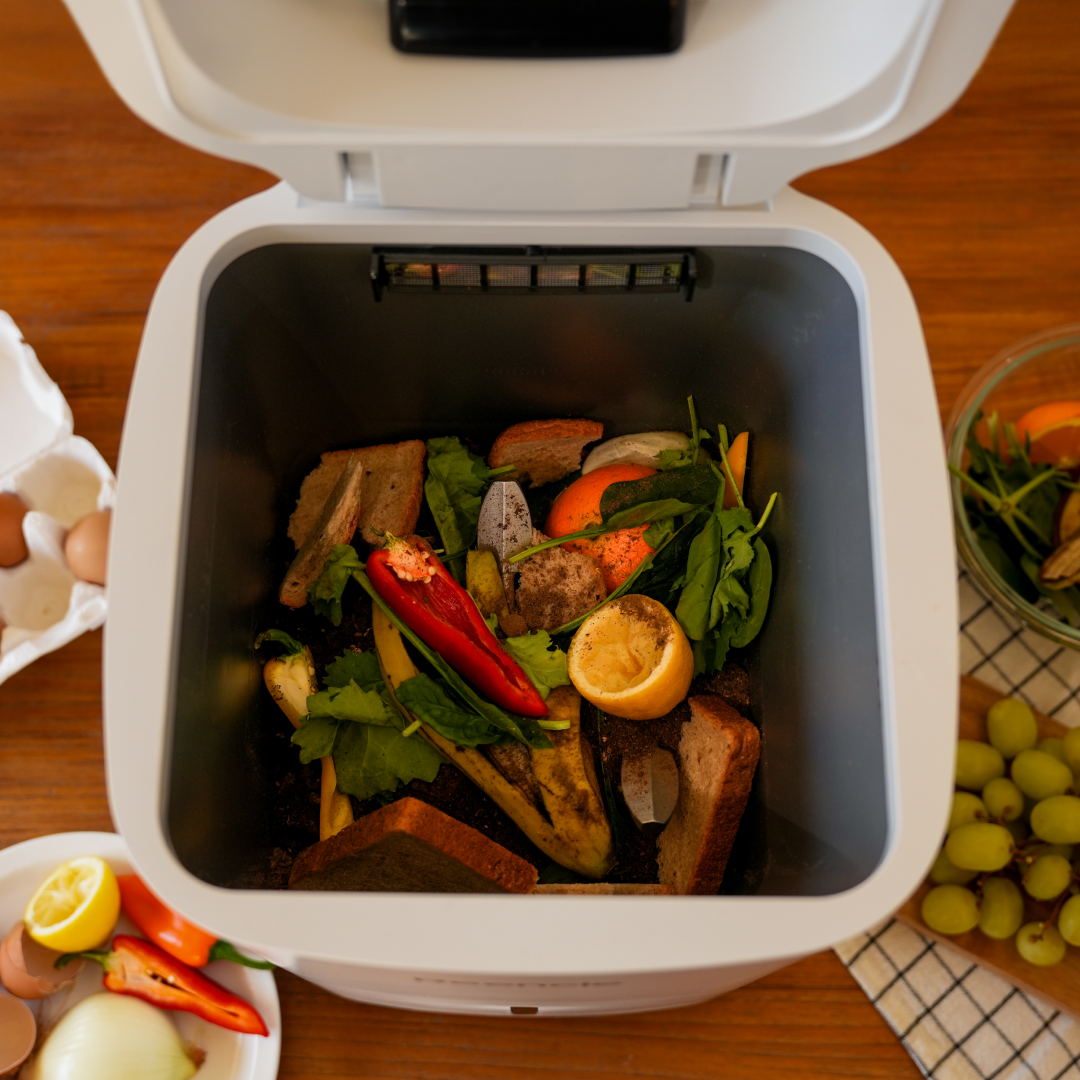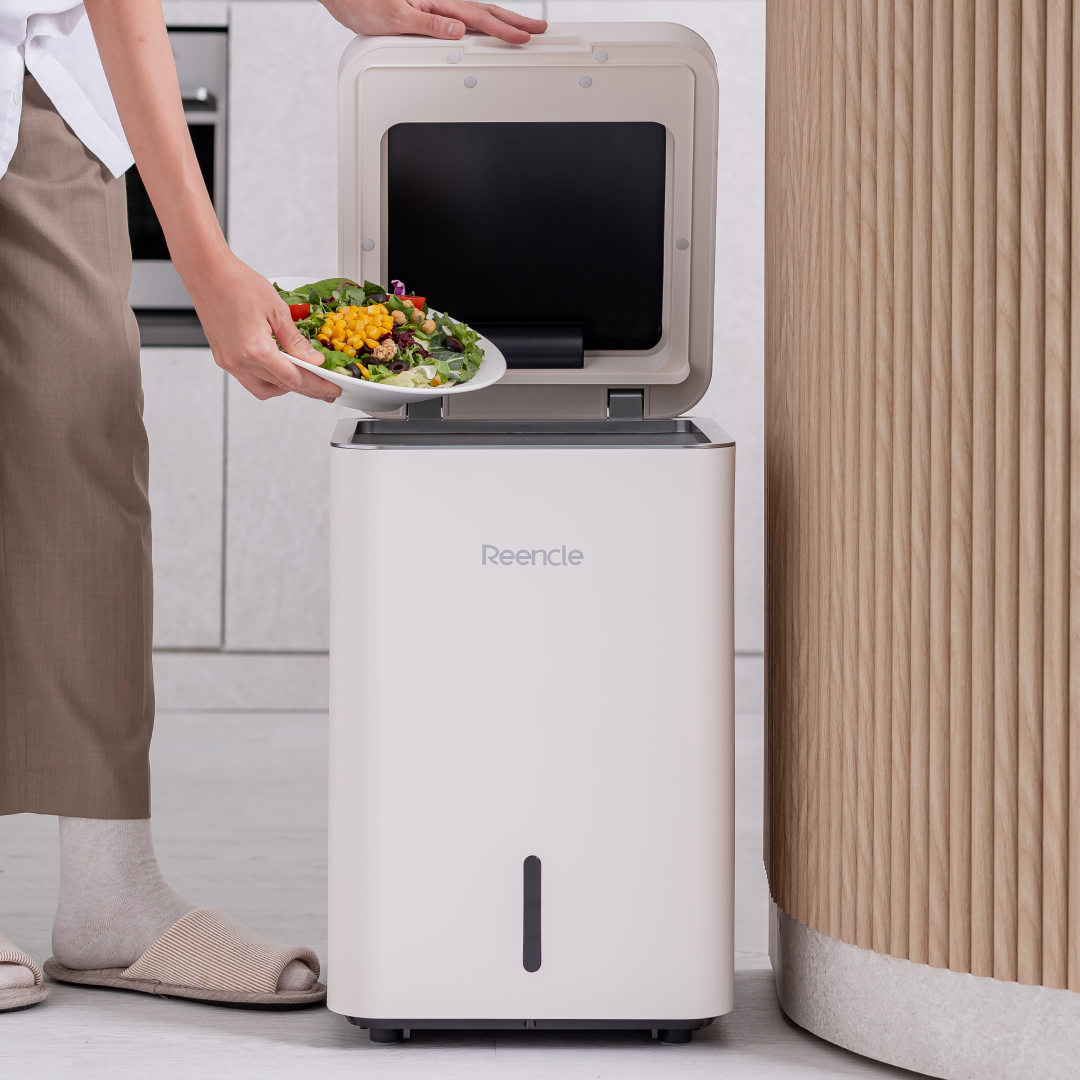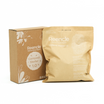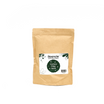Why dehydrated food waste
isn't a real compost


In recent years, the movement towards sustainability has gained significant momentum, leading many eco-conscious individuals and organizations to explore organic recycling methods, such as composting. One method that has surfaced is the dehydration of food waste. However, there's a common misconception that dehydrated food waste can be used directly as compost. This article will delve into why dehydrated food waste isn't a real compost, the importance of soil enrichment, and the role of proper composting in organic recycling.
We have compiled a comprehensive guide that addresses these topics:
Table of contents a. Composting Definitions b. Why Compost at Home? c. Benefits of Composting
Why does our partnership matters
For every purchase, we plant 1 TREE to nurture our planet 🌲Together, we are sowing the seeds of change and cultivating a greener, more sustainable world.
Anything else?
Anything else?You willl also receive an official certificate from Greenspark as a token of appreciation for your commitment to the environment! 📜
How do we see the progress?
How do we see the progress?Join us on this remarkable journey towards an impact dashboard.You can see how your eco-smart choice made the world a better place
 View more
View more
Your support empowers reforestation, fights climate change,
and paves the way for a brighter, eco-friendly future.
Join us on this remarkable journey towards a cleaner,healthier planet.
Shop with a purpose, shop with Reencle! 🛒💚

Why does our partnership matters
For every purchase, we plant 1 TREE to nurture our planet 🌲Together, we are sowing the seeds of change and cultivating a greener, more sustainable world.
Anything else?
Anything else?You willl also receive an official certificate from Greenspark as a token of appreciation for your commitment to the environment! 📜
How do we see the progress?
How do we see the progress?Join us on this remarkable journey towards an impact dashboard.You can see how your eco-smart choice made the world a better place
 View more
View more
Your support empowers reforestation, fights climate change,
and paves the way for a brighter, eco-friendly future.
Join us on this remarkable journey towards a cleaner,healthier planet.
Shop with a purpose, shop with Reencle! 🛒💚
a. Composting Definitions

Composting represents a regulated, aerobic (requiring oxygen) procedure wherein organic substances undergo natural decomposition to transform into a nutrient-enriched, biologically stable soil amendment or mulch. The resultant outcome is known as compost. Throughout the composting process, microorganisms consume the materials integrated into the compost pile, utilizing carbon and nitrogen for growth and reproduction, water for material digestion, and oxygen for respiration. It is entirely feasible to engage in composting at home by incorporating kitchen food scraps along with dry leaves and woody debris from your yard.
1. Understanding Composting and Its Benefits

Before diving into the specifics of dehydrated food waste, it's essential to understand what composting is and why it's beneficial. Composting is a natural process that breaks down organic matter, such as food scraps and yard waste, into a nutrient-rich material known as compost. This material is a valuable addition to soil, enriching it with nutrients that plants need to grow, improving soil structure, and enhancing its ability to retain moisture.
The Science Behind Composting
Composting is a biological process involving microorganisms such as bacteria, fungi, and actinomycetes that decompose organic matter. These microorganisms require oxygen, moisture, and a balanced mix of carbon-rich materials (browns) and nitrogen-rich materials (greens) to thrive and break down waste effectively.
Benefits for Soil and the Environment
Using compost in gardens and on farms has numerous benefits. It reduces the need for chemical fertilizers, promotes higher yields of agricultural crops, helps regenerate poor soils, and can aid in preventing soil erosion. From an environmental perspective, composting can reduce methane emissions from landfills and lower your carbon footprint.
2. Dehydrated Food Waste: What Is It?
Dehydrated food waste is created using an electric dehydrator or a dehydration system that removes the moisture from food scraps. The end product is a dry, reduced-mass material that some might mistake for compost.
The Dehydration Process
The dehydration process involves exposing food waste to high temperatures, which evaporates the water content. The process significantly reduces the volume of the waste, making it easier to handle and transport. However, this process does not involve the biological decomposition that occurs in traditional composting.
3. Why Dehydrated Food Waste Isn't a Real Compost
Dehydrated food waste lacks the microbial life essential for compost's benefits to soil and plants. While dehydration reduces mass and volume, it doesn't break down the organic material into the humus-like substance that defines true compost.
The Lack of Microbial Activity
True compost is teeming with beneficial microorganisms that help to release nutrients into the soil. Dehydrated food waste has not undergone microbial decomposition, meaning it doesn't contain these necessary microbes for soil enrichment.

Nutrient Imbalance and Plant Health
Using dehydrated food waste directly in the garden can create an imbalance in the soil's nutrient profile. Unlike compost, which has a stable and beneficial nutrient ratio for plants, dehydrated food waste may contain concentrated levels of certain nutrients that can harm plant growth and soil health.
The Need for Further Decomposition
In reality, dehydrated food waste needs to undergo further decomposition to become true compost. It can be added to a traditional compost pile or system, where it will eventually break down with the help of microorganisms, given the right conditions.
4. The Role of Composting in Organic Recycling
Composting is a cornerstone of organic recycling, turning waste into a resource. It closes the loop by returning organic materials back to the soil, contributing to a circular economy and reducing the waste stream.
How Composting Contributes to Soil Enrichment
Compost adds organic matter to the soil, which improves soil structure, provides nutrients, and enhances the soil's ability to hold water and nutrients. This results in healthier plant growth and increased biodiversity in the soil ecosystem.
4. Best Practices for Effective Composting

For those looking to compost at home or in their community, here are some best practices to follow:
1. Maintaining the Right Balance
A healthy compost pile should have a mix of greens and browns. Greens are nitrogen-rich materials like food scraps and grass clippings, while browns are carbon-rich materials like dried leaves and branches. The ideal ratio is about 3 parts browns to 1 part greens.
2. Aeration and Moisture Control
Regularly turning the compost pile introduces oxygen, which is crucial for aerobic decomposition. The pile should be moist but not soggy, maintaining the consistency of a wrung-out sponge.
3. Size and Temperature
The compost pile should be large enough to retain heat but small enough to allow for proper aeration. A temperature between 135-160°F (57-71°C) is ideal for decomposing materials quickly while killing most seeds and pathogens.
5. Alternative Methods of Organic Recycling
While composting is a popular method of organic recycling, other methods can also be effective.
1. Vermicomposting
Vermicomposting involves using worms to break down organic waste. This can be a faster process than traditional composting and produces vermicast, a highly nutritious material for plants.
2. Bokashi Fermentation
Bokashi is a method that ferments organic waste in an anaerobic environment, using a specific inoculant. It's a quick process that can handle types of waste that aren't typically composted, such as meats and dairy.
3. In-Vessel Composting
This method uses a contained system to compost organic waste, which can be more efficient and less labor-intensive than traditional composting. It's ideal for urban settings or businesses with limited space.
6. Conclusion
Dehydrated food waste is not a direct substitute for compost because it lacks the microbial life and decomposition necessary for soil enrichment. Proper composting involves a biological process that dehydrated food waste alone cannot replicate. By understanding the role of composting in organic recycling and the best practices for creating real compost, individuals and organizations can contribute to soil health and environmental sustainability effectively.
For those who dehydrate food waste, integrating this material into a traditional composting system can be a valuable step in creating a true compost that benefits both the garden and the planet.
b. Why Compost at Home?

● Composting is like nature's way of recycling. It's a powerful way for us to cut down on our trash, help with climate change, and make good soil. When we turn our kitchen scraps and yard waste into compost, we're changing our leftovers into something useful for the Earth.
● You can easily recycle the food scraps and yard waste you make at home all year long by composting. This helps a lot because it reduces the amount of stuff that would normally go to landfills or be burned in incinerators – things like leaves, grass clippings, and food scraps. Plus, it stops harmful gases from going into the air.
● Composting doesn't take much work, fancy tools, money, or know-how, and it can be kind of fun. The cool part is you end up with a free, good-quality soil booster called compost. This means you won't need as much plant food or bug spray, so you save money.
● The compost you make isn't just good for reducing waste and saving cash. You can use it to make your soil healthier, stop soil from washing away, save water, and make your plants in the garden and yard grow better. In simple terms, composting is an easy and helpful way to deal with trash that benefits both the environment and your own space..











